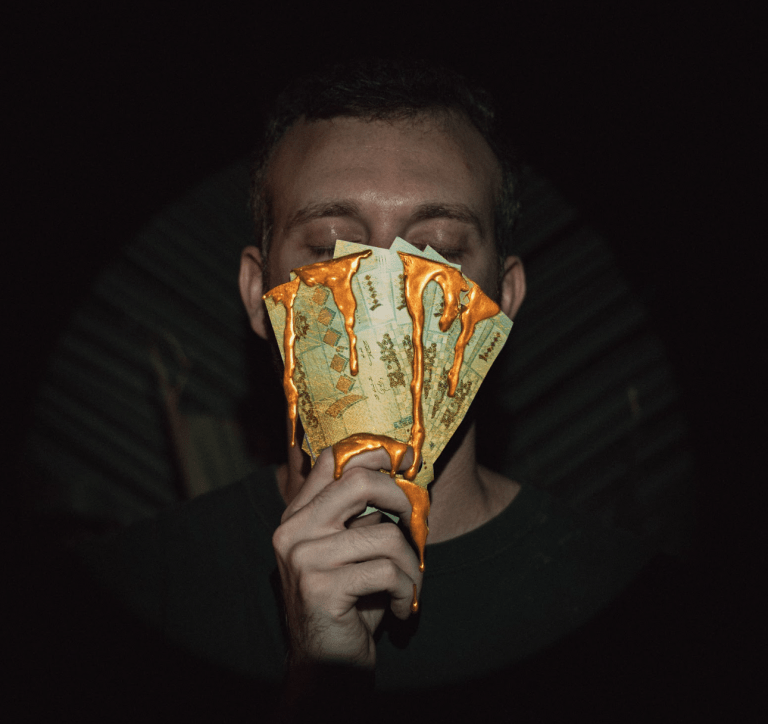At 14, Magnum snuck into a studio after his brother’s band had wrapped up their session. With a few friends, he recorded his very first track—“Faja2tak mou” ft. Hamam and Amer. It spread through his school like wildfire, a raw spark that hinted at what was coming. “That was the moment I realized I wanted to make music for life”. “God knows where they are today, but that track went kind of viral at the time.”
Since then, Magnum has been building his voice across borders, carrying pieces of his Lebanese identity with him while growing up in Dubai. The blend shaped not only his accent and experiences but also his lyrical instincts. “Being Lebanese has its influence on my lyrics. I use well-known Lebanese words and sayings that sometimes only people in Lebanon would understand, like ‘balet el baher.’ It’s part of my DNA.”

In the Love of Autotune
But if Lebanon gave him language, it was autotune that gave him direction. “What drew me to trap is autotune,” he admits, without hesitation. “I love autotune and don’t think I’d be making music without it. The mix of bass and autotune fills my cup.” The honesty in that statement feels genuine in a genre often obsessed with technical flex. For Magnum, it’s not about purism—it’s about resonance.
When asked about his north star, he doesn’t hesitate: Lil Wayne. “Charisma, execution, performance, and lyrics. He looks so cool as well,” Magnum says with the kind of reverence reserved for someone who shaped an era. That mix of charisma and craft is something he clearly aspires to in his own way.

The Meaning of “1/2 Million”
Magnum’s latest track, “1/2 Million”, carries a title that invites curiosity. Why that number? What’s hidden in its roundness? “The title symbolizes hard work. Nice cars and watches are usually around that number, and table settings sometimes,” he explains. There’s both luxury and discipline in the metaphor.
And yet, when asked to imagine if he had only “1/2 million minutes” left to live—just under a year—his answer is grounded. “I’d spend them with my family, living slowly to feel each day as much as I could. I might make a song if that situation inspired me.”
A Confrontational Kind of Belonging
That idea of the table—literal and symbolic—runs deep for him. His mother’s dinner tables are etched in his memory: Christmas spreads layered in white with green branches, snowflakes, snowmen, crystal cutlery, and tiny houses. “Her tables are never half made, always to the top,” he recalls. “The table gave detailed and rich energy.” He once said, “Only real ones get to sit at that table.” So what makes someone “real”? “Sincere and true people, hard working and loyal,” he answers simply.
If his mother’s tables were places of belonging, then his track “1/2 Million” is its own kind of table. But this one isn’t about comfort. “The track is confrontational,” Magnum explains. “A lot of statements that are clear, a reality check for whoever is interested. And can boost their potential if needed.”

Between Languages, Between Cultures
Like many who grew up in multicultural environments, Magnum’s work slips between languages with ease. “My dominant language is Arabic,” he says. “English comes in when it feels natural. Some sayings just sound cooler in English, or a word hits differently. That’s when they come into play.”
That instinct for balance shows up again when he’s asked about ambition. “The sweet spot is a balance between our dreams and what we are capable of handling. Accepting how much we can handle is essential for sustainability and a healthy execution. 60% logic, 40% dream.” It’s the kind of formula that could apply equally to music, life, or the way he composes a verse.

A Favorite Track, A Future Vision
Of all his work so far, “Malet” holds the deepest place in his heart. “Full of energy, performing it live feels like a movie or a play. I imagine myself in every bar, in a different scenario.” It’s not just about listening—it’s about inhabiting the track fully, becoming every character in it.
Looking ahead, he’s clear about his path: “Music, music, music! Tapping into different genres.”
From a teenager sneaking into a studio to an artist weaving Lebanese sayings, autotuned trap, and his mother’s immaculate tables into his music, Magnum is less interested in fitting into categories and more focused on building spaces—tracks, tables, stages—where only the real ones sit.
WE ALSO SAID: Don’t Miss…Wael Shawky on Leading the First Art Basel Qatar: An Interview



